Pro-Kremlin media misrepresent Belarusian opposition’s policy platform
An “anti-Russian” national security reform agenda
Pro-Kremlin media misrepresent Belarusian opposition’s policy platform

An “anti-Russian” national security reform agenda that pro-Kremlin media linked to the opposition was never part of the opposition’s official platform

Several pro-Kremlin commentators and websites jumped at the opportunity to criticize what they characterized as an anti-Russia national security policy proposal supposedly released by the Coordination Council, a newly formed coalition of Belarusian opposition activists.
Amid the ongoing turmoil in Belarus, the Kremlin threw its support behind current Belarusian President Alyaksandr Lukashenka following the August 9 presidential election, including Russian President Vladimir Putin making an offer of law enforcement assistance as recently as August 27. His main opponent, Sviatlana Tsikhanouskaya, meanwhile, continues to dispute the results of the election, claiming they were “falsified” and calling for a new election after all political prisoners and jailed Lukashenka opponents have been released. Pro-Kremlin media, therefore, are using every opportunity to cast doubt on Tsikhanouskaya’s credibility and legitimacy, including by leveling distorted or deliberately misrepresentative allegations.
In this light, the controversial national security proposal was found on the Belarusian-language edition of the now-defunct reformby.com, a website linked to Tsikhanouskaya’s campaign and from which her official campaign website draws heavily. It did not appear on the Russian-language version of the site, however, which was the default version presented to users. In fact, the only way to access the Belarusian-language version of the site was through a dedicated URL — there was no user interface to toggle easily between language editions, suggesting that the version of the site with the policy proposal was never meant to be seen in the first place. An analysis of the source code by the DFRLab revealed that the text to which pro-Kremlin media were referring was likely a relic from another website, zabelarus.com, that the website administrator of reformby.com forgot to delete in copying source code over.
The national security program in question was never adopted as part of the opposition’s official platform. By all indications, pro-Kremlin media appear to have taken a sloppy error on the opposition’s website and presented it as the Belarusian opposition’s endorsement of an anti-Russia national security agenda.
Reformby.com and zabelarus.com
Ahead of the August 9 election, Tsikhanouskaya published her policy agenda on her official campaign website, tsikhanouskaya2020.by. According to the Internet Archive’s WayBack Machine, the webpage listing the agenda was edited several times, mostly moving around the location of links to two defunct websites, reformby.com and zabelarus.com. Reformby.com was used by the Tsikhanouskaya campaign as an unofficial extension of its policy platform and previously listed sectoral reform proposals that it claimed were developed with the help of “experts.” Zabelarus.com, meanwhile, was used to host the agenda of the Reanimation Package of Reforms (RPR) for Belarus, a separate coalition of political organizations advocating for policy reform.
The RPR website included a policy proposal on national security that called for Belarus to take several actions to distance itself from Russia, both economically and politically, including Belarus’s formal withdrawal from the Union State, Eurasian Economic Union, and other economic alliances with Russia; a ban on pro-Russia organizations, whose activities run contrary to the national interest; and the introduction of criminal liability for public statements that dispute the existence of Belarus as an independent sovereign nation.
The content on reformby.com was nearly entirely copied over from the RPR’s website. An examination of the source code for both websites showed that the web developer for reformby.com simply copied over blocks of HTML code and switched the blocks’ location, animation, several titles, and — most importantly — omitting the controversial national security section.
There was a catch, however — these edits were only made to the Russian-language version of the website. The code for the Belarusian version of the website was left untouched, retaining the original national security section exactly as it appeared on zabelarus.com.
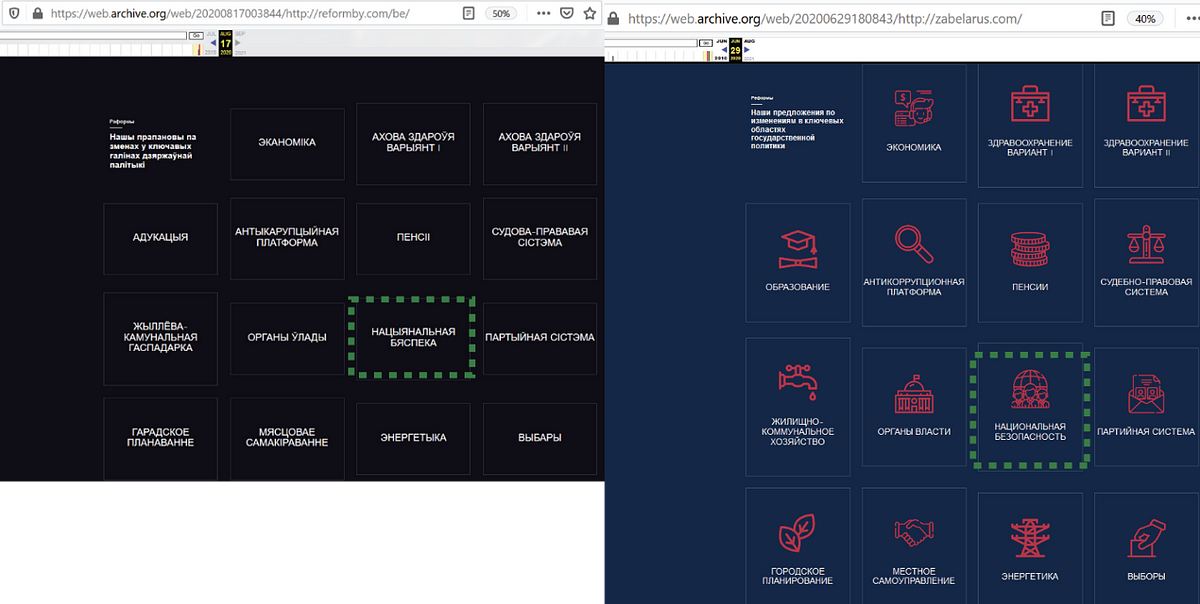
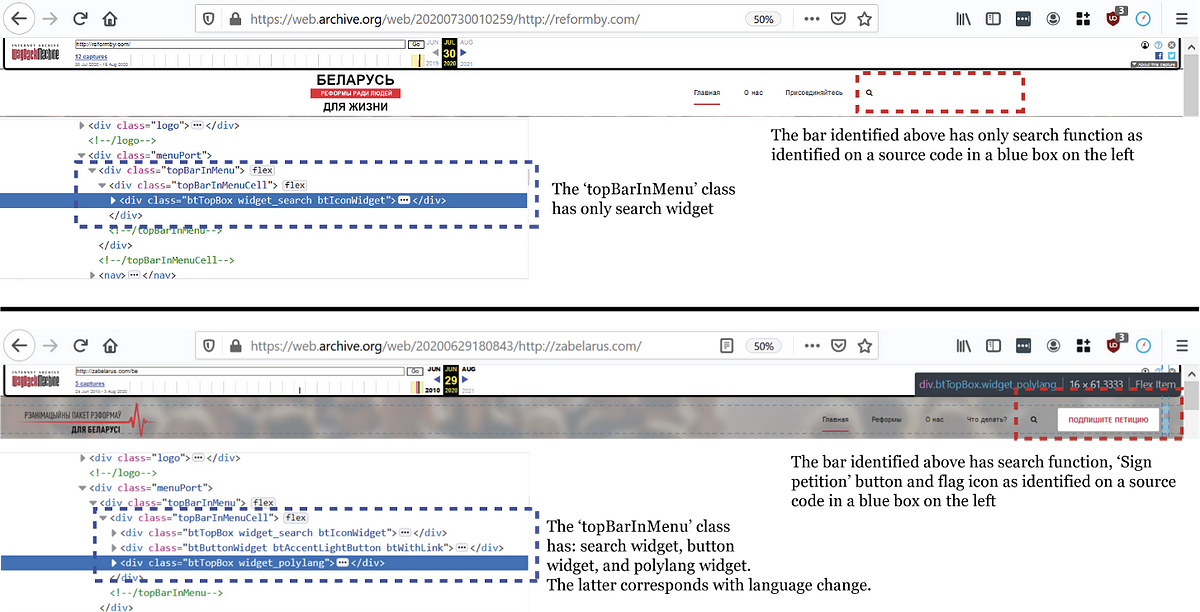
One possible explanation of this discrepancy between the different language editions is that the opposition was attempting to deceive its audience, by presenting differing policy platforms to Belarusian and Russian-language speakers. The more likely explanation, however, is that this was simply the result of human error and sloppy or hurried website construction. There was no user-friendly way to toggle languages between the Russian and Belarusian languages of the site. The Russian version was the default, and the only way to view the Belarusian edition — the version that included the national security section — was to add “/be” to the end of the website URL. This indicated that the Belarusian version of the site was not meant to be visible to the general public, and the web developer of reformby.com may have simply not realized that the edits made to the Russian-language version of the website would also have to be made to the Belarusian version.
Tsikhanouskaya’s campaign website
Tsikhanouskaya’s official campaign website was a separate website altogether. Although it drew heavily from and linked to reformby.com and zabelarus.com at certain points in time, it never included the national security section from the Belarusian-language edition of reformby.com.
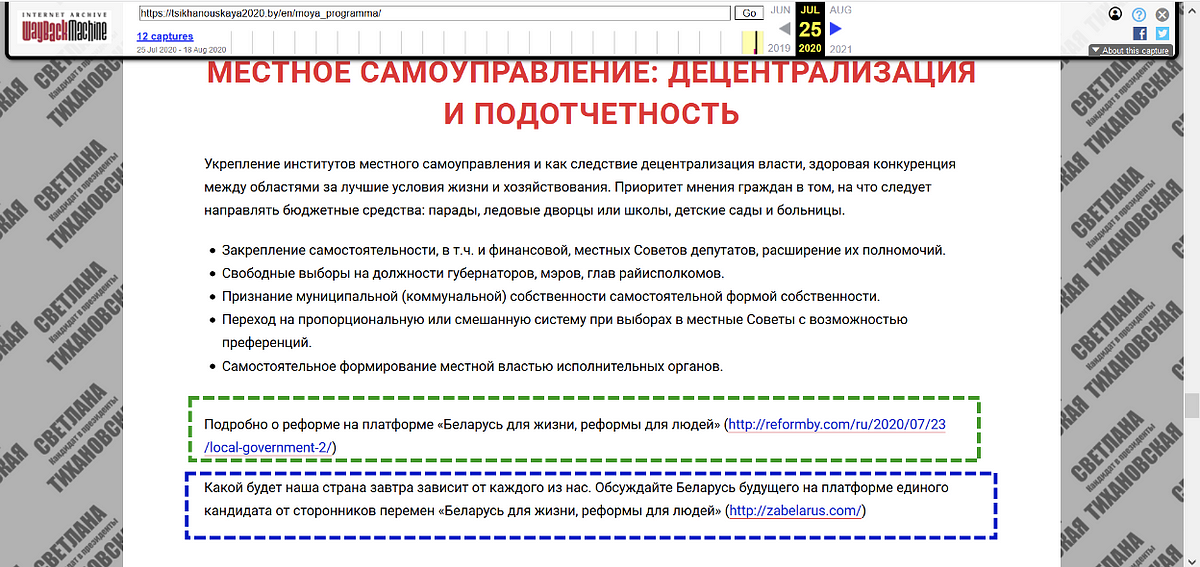
A version of the campaign website from August 3 excluded the links to reformby.com and zabelarus.com but added a disclosure that Tsikhanouskaya’s team cooperated with the coalition of experts behind reformby.com. The latest version of Tsikhanouskaya’s campaign site mentions that the campaign cooperated with outside experts on developing policy proposals but does not link directly to reformby.com.
The closest Tsikhanouskaya’s website came to including the national security proposal from reformby.com was a section on international relations, visible on the oldest archived edition of the website, that stated Belarus was an independent nation and should be friendly with all other nations, but only when it is in “the [Belarusian] state’s interest.” The section did not call for Belarus to withdraw from economic alliances with Russia or to institute a ban on pro-Russia organizations.
The narrative’s spread
Pro-Kremlin media presented the national security proposal on the Belarusian edition of reformby.com as part of Tsikhanouskaya’s platform. On August 13, former Russian journalist and political prisoner Aleksandr Sokolov posted on his VKontakte (VK) page that the opposition is preparing a “bourgeois coup to capture and rob the country and set up a pro-Western puppet regime,” citing the national security agenda published on the RPR website.
Sokolov mentioned that the people behind RPR are members of Tsikhanouskaya’s campaign team, based on a phrase from reformby.com that its materials were based on the RPR’s work. Sokolov, however, provided an editorialized version of the RPR text rather than the exact text. The post received 274 likes, 198 shares, and 5,600 views. The post was republished a few times on the VK without significant engagement. Also, Sokolov reposted the same language to his Facebook page, which received 394 reactions, 419 comments, and 588 shares.
On August 16, pro-Kremlin commenter Grigoriy Ignatov published an article on the website Journalist Truth that played a significant role in the narrative’s spread. Journalist Truth is owned by the Federal News Agency, a part of the Internet Research Agency troll factory in Saint Petersburg. In the story, the author cited the full national security text from RPR’s zabelarus.com and likened its policy contents to the tide of Russophobia in Ukraine, while also insinuating that the Ukrainian revolution was orchestrated by “Nazis,” a well-established disinformation narrative targeting pro-democracy activists in that country. This article was reprinted or partially cited by several fringe outlets.
The final — and one of the most influential — critic of the national security proposal was Armen Gasparyan, a journalist at Kremlin-owned outlet RT. On August 16, Gasparyan wrote on his Telegram channel that “The program of the Belarusian opposition appeared. Read carefully and recall Ukraine,” a comment he accompanied by reprinting the national security block and a linking to zabelarus.com. This post was viewed 143,000 times and forwarded by multiple channels belonging to pro-Kremlin journalists, including Vladimir Soloviev, Sergey Kolyasnikov, and Yulia Vityzeva.
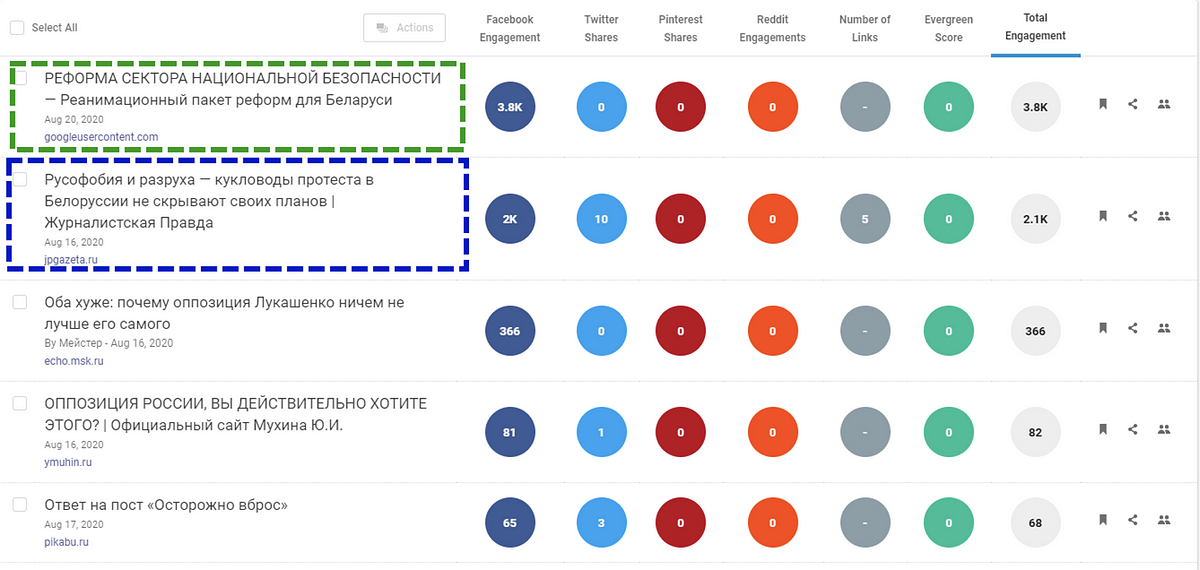
Gasparyan’s message was successful off of Telegram as well. First, the text of his post was actively shared on VK, with multiple pages and accounts copying his message. Gasparyan’s post was also cited by fringe pro-Kremlin media, such as Tsargrad and Rossaprimavera. Several other outlets Ukraina.ru, Vzglyad, Eadaily, and RIA published or discussed the platform without a direct link to Gasparyan.
Russian state-owned outlet RT published an op-ed to its official Telegram channel that cited the incorrect national security section — that taken from the non-public Belarusian version of Tiskhanouskaya’s website — of her platform. Thanks to pro-Russian media’s amplficiation, the incorrect version of the platform ultimately reached Lukashenka, who publicly criticized it during the Belarus Security Council’s meeting on August 18. In response to Lukashenka’s critique, Maria Kolesnikova, a member of the Coordination Council that Tsikhanouskaya initiated as a means of advocating for Lukashenka’s departure, stated that withdrawal from the Union State of Russia and Belarus is not on the candidate’s agenda.
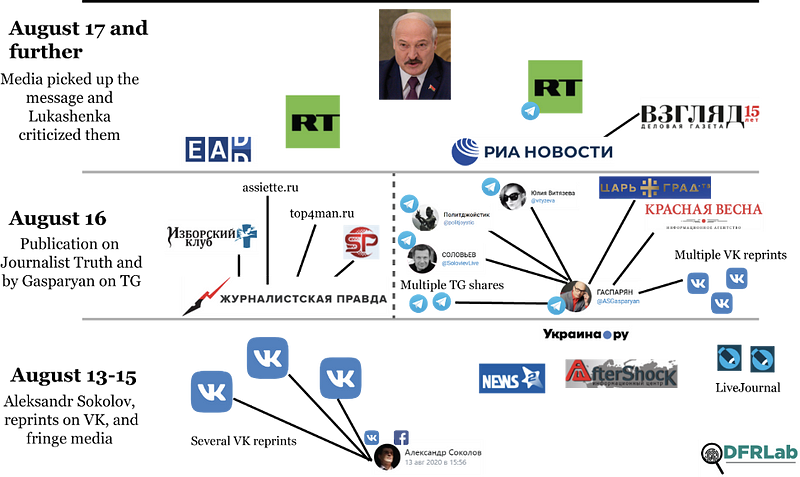
Russian independent media outlet The Insider reported that pro-Kremlin media spread misleading information linking the proposal to Tsikhanouskaya’s official platform. Representatives of RT, however, continued pushing the claim that the proposal was part of Tsikhanouskaya’s platform, stating that it is listed on the Belarusian edition of reformsby.com. As mentioned above, however, this edition of the website appears to have not been for public availability.
Roman Osadchuk is a Research Assistant, Eurasia, with the Digital Forensic Research Lab.
Follow along for more in-depth analysis from our #DigitalSherlocks.

